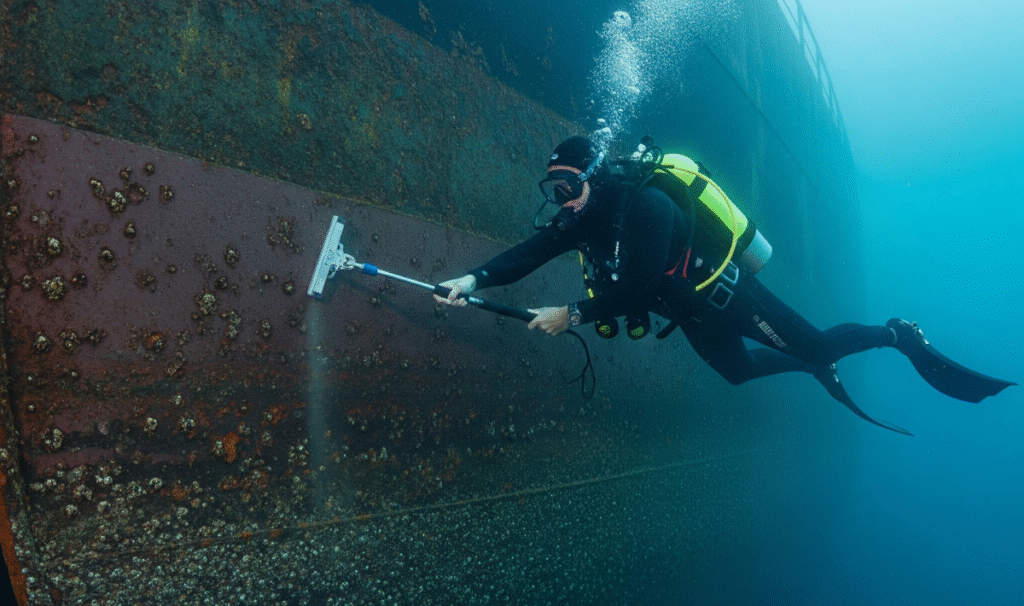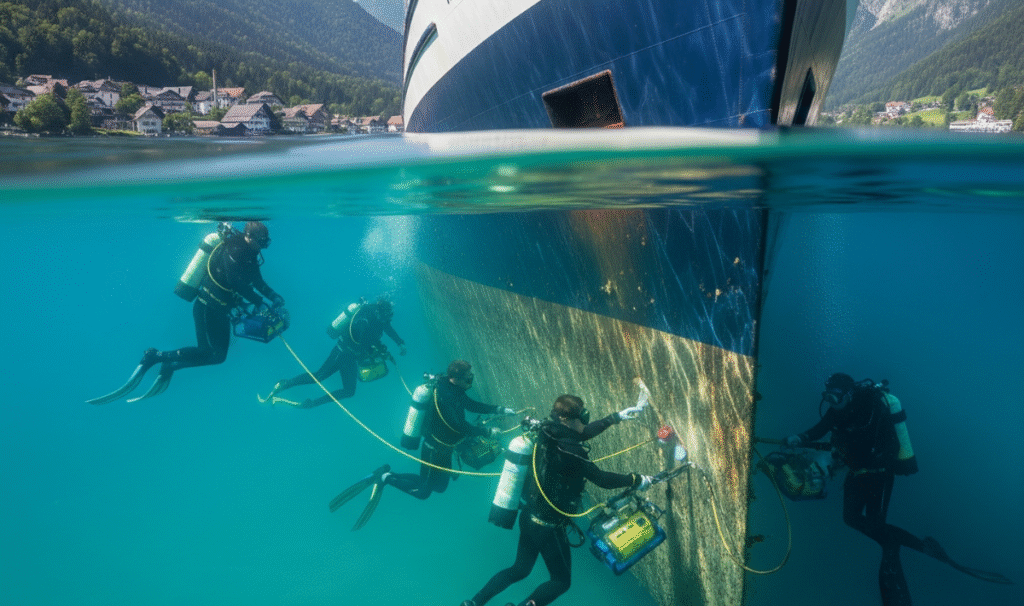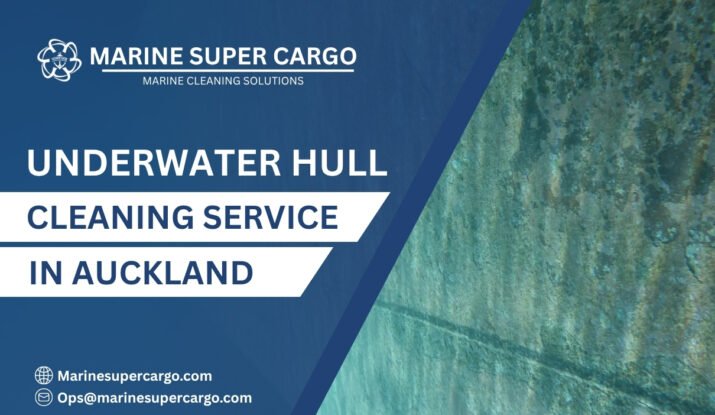If you’re a boat owner or skipper in Auckland, understanding the importance of underwater hull cleaning in Auckland might just be the secret to smoother sailing and better vessel performance. Imagine your boat as a runner, and the hull as the shoes: when those shoes are dirty and clogged, your runner slows down, tires more easily, and saps your energy. The same goes for your boat cruising through Auckland’s vibrant but challenging waters. Let’s dive into why hull cleaning is essential here, and how you can keep your vessel in top shape.
Why Underwater Hull Cleaning in Auckland Matters for Your Vessel
Salty seas teem with life — all eager to cling to your hull. This buildup, called biofouling, includes algae, barnacles, and other marine organisms. Over time, it acts like a heavy wetsuit strapped to your boat, reducing speed, increasing drag, and forcing your engine to consume more fuel. Moreover, if left unchecked, this growth can damage your hull’s protective coatings and metalwork, making repair costs soar. In Auckland’s waters, where marine life thrives, regular underwater hull cleaning is a critical part of keeping your vessel efficient, safe, and ready to sail.

The Unique Marine Environment and Fouling Challenges of Underwater Hull Cleaning in Auckland Waters
Auckland’s marine environment is a dynamic playground of tidal currents, warm seawater in summer, and a diverse population of fouling species. The harbour and coastal areas encourage fast-growing organisms to colonize boat hulls quickly. You might notice your vessel gathering slime and barnacles faster than you’d expect, especially when moored or idle. This constant challenge means hull cleaning here isn’t just maintenance — it’s essential survival.
To tackle these challenges responsibly, vessel operators are encouraged to follow international best practices like those outlined in the IMO Guidelines for the Control and Management of Ships’ Biofouling, helping reduce invasive species transfer and protect Auckland’s rich marine ecosystems.
Consequences of Neglecting Underwater Hull Cleaning in Auckland
Imagine trying to sprint while wearing heavy boots filled with mud. That’s what happens when biofouling takes hold:
- Increased Drag and Slower Speeds: Fouling makes your boat less nimble and slower across the water.
- Higher Fuel Bills: Engines fight harder to maintain speed, guzzling more fuel.
- Hull Damage and Corrosion: Organisms burrow into coatings and metal, risking corrosion.
- Regulatory Issues: New Zealand has strict biofouling management policies to protect its aquatic ecosystem — neglect can lead to fines and denied port entry.
How Underwater Hull Cleaning in Auckland is Performed
Professional underwater cleaning here is more than just scraping barnacles off. It’s a coordinated, technologically supported operation.
Safety Measures and Dive Preparation
Before divers enter the water, teams perform rigorous safety checks, including inspections of weather, tides, and underwater visibility. Safety gear is tested, and environmental protocols are set to protect both crew and marine life. Auckland’s busy marinas demand precision and readiness.
These procedures align with global port safety and environmental standards supported by the International Association of Ports and Harbors (IAPH), ensuring that hull cleaning operations are both effective and eco-responsible.
Tools, Technology, and Techniques Used by Auckland Divers
Auckland divers use an arsenal of tools tailored to hull type and fouling severity:
- Rotary brushes and scrapers remove barnacles and algae.
- Water-jet systems for delicate or sensitive coatings.
- Underwater drones and cameras inspect hulls before and after cleaning to ensure quality and minimize damage.
- Debris containment systems help comply with strict biofouling regulations by preventing ecological contamination.
Choosing a Professional Service of Underwater Hull Cleaning in Auckland
To get the best results and avoid trouble, choosing the right contractor is crucial.
What to Look for in a Reliable Contractor
- Certified commercial divers experienced in Auckland waters.
- Compliance with Ministry for Primary Industries (MPI) biofouling regulations.
- Positive reviews and a proven safety record.
- Use of environmentally responsible cleaning methods and proper disposal protocols.
- Ability to coordinate timing with vessel schedules and port entry requirements.
Recommended Frequency of Cleaning for Auckland Conditions
Due to fast fouling rates, boat owners often schedule cleaning every 1-3 months, depending on vessel use, hull materials, and antifouling treatments. Regular maintenance prevents costly fouling buildup and supports easy port access.
Environmental Regulations and Biofouling Management in Auckland
New Zealand’s MPI enforces strict biofouling rules to prevent marine pest spread. Underwater hull cleaning services in Auckland follow these rules closely, using eco-friendly products and debris containment to protect delicate ecosystems and ensure your vessel meets entry standards. Proper documentation and inspection reports are often required by port authorities.
Pricing Insights: What to Expect for Underwater Hull Cleaning in Auckland
Costs vary by vessel size, fouling extent, and job complexity. Typical rates range from NZD 8 to 15 per foot, with extra charges for difficult hulls or additional services such as propeller polishing or niche area cleaning. While prices might seem high, they pale compared to possible fines, denied entry, or major hull repairs due to neglect.
DIY Hull Cleaning vs. Professional Services: Pros and Cons
Considering cleaning your hull yourself? Here’s what to bear in mind:
- DIY hull cleaning risks injury, hull damage, and insurance complications.
- Professionals bring training, equipment, and legal compliance.
- Eco-friendly protocols and thorough cleaning are more likely with certified teams.
- DIY can work for superficial topside cleaning, but underwater work is best left to experts.
Benefits of Regular Underwater Hull Cleaning in Auckland: Efficiency, Cost Savings, and Hull Longevity
Regular cleaning isn’t just about looks. It translates into:
- Significant fuel savings due to reduced drag.
- Optimized vessel speed and safer handling.
- Prolonged hull life by preventing corrosion.
- Avoidance of biosecurity fines and hassle.
- Peace of mind knowing your boat is ready for every voyage.

Real Stories from Auckland Boat Owners and Operators
Many skippers have stories about underwater hull cleaning in Auckland saving their day. One local charter captain credits a recent cleaning with noticeably improved fuel efficiency and smoother sailing through Waitematā Harbour. Another yacht owner shares how regular cleaning prevented a costly hull repair after early detection of corrosion spots during inspection.
Conclusion: Keep Your Hull Clean and Sail Confidently in Auckland
Underwater hull cleaning in Auckland is a vital part of vessel care that pays dividends in performance, savings, and compliance. In these biologically rich and strictly regulated waters, keeping your hull clean isn’t optional; it’s essential. By choosing trusted professionals, sticking to recommended cleaning schedules, and respecting environmental laws, you ensure your boat remains a nimbly gliding partner on every Auckland adventure. So let’s embrace hull hygiene and sail smarter, faster, and freer.
FAQ:
Q1. How often should I schedule underwater hull cleaning in Auckland?
Most vessels benefit from cleaning every 1 to 3 months, adjusted for usage and hull type.
Q2. Are there environmental risks involved with hull cleaning?
No, when done by certified services that follow MPI-approved eco-friendly and containment protocols.
Q3. What does professional underwater hull cleaning typically cost in Auckland?
Expect around NZD 8–15 per foot, depending on vessel size and fouling severity.
Q4. Can I clean my boat’s hull underwater myself?
It’s not recommended due to safety risks, potential damage, and regulatory requirements; professionals are preferred.
Q5. How does underwater hull cleaning improve my boat’s fuel efficiency?
Removing fouling reduces drag, helping engines use less fuel and improving speed and handling.


